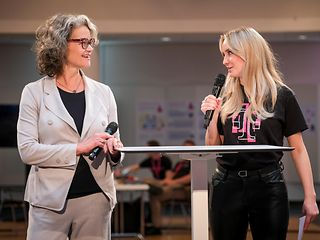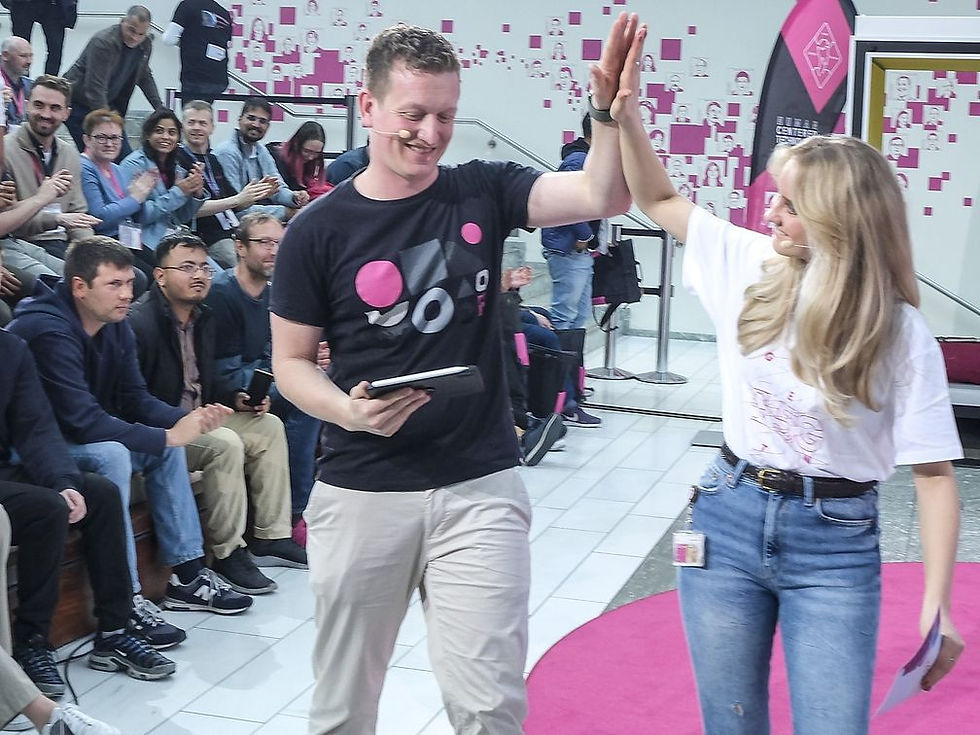A Corporate Communications traineeship at Deutsche Telekom is an intensive, practical experience that enables us as trainees to delve into the world of our corporate communications and gain valuable skills. We become actively involved in the different aspects of our communication workflows. For me, one of the first topics was hosting.

Claudia Nemat (Board Member for Technology & Innovation) shared ideas with the participants at the hackathon and then discussed them in a large group. © Deutsche Telekom
My personal challenge
Three days, participants from eight different countries, event language English. How does that sound? For me, honestly, it sounded like a (very) big deal. Here it was - my first opportunity to get involved in hosting. I had always wanted to take a step in this direction. But I also knew that it was a big challenge and that there were no guarantees that I would be any good at it.
The event and how it came about
In this case, a colleague asked me if I wanted to take on this job. It was for a so-called “hackathon,” which is like a creative sprint for software and hardware development. I had doubts about whether or not a three-day event with the above-mentioned group of participants would be the ideal starting point for my debut as a host. But a relaxed “trust the process” from my colleague set me at ease again.
What constitutes a Corporate Communication traineeship at Deutsche Telekom?
This is precisely the point that I think makes a Corporate Communication traineeship at Deutsche Telekom unique. As trainees, we are allowed to take on tasks that require individual responsibility. I am very grateful that we are allowed to reposition ourselves in unknown fields in which we are welcome to try and develop. We can and are encouraged to step out of our comfort zone.
Hosting
And so I thought: Time will prepare. And that’s a crucial keyword for me. Good preparation is half the battle - or actually more than half. Here are a few tips that I find make hosting an event easier:
Know the event - not just roughly, but the entire process. I have noticed that I feel much more confident and relaxed if I always know exactly what’s coming up now and next. Because as a host, you have to be flexible if something changes at short notice and you must be able to answer questions about the event.
Talk to the organizer to find out what aspects they also find important in terms of hosting. There is often a specific reason for the event. Or find out about the history of the event, if it is not being held for the first time. These are points that are easy to integrate for inclusion in the introduction. They provide a good framework and draw the participants in again.
If there are guest speakers: Ask them for a short biography. You’ll need it when introducing them onto the stage. This way, you don't run the risk of accidentally using incorrect or outdated information about the person you're researching on your own.
Make a list in advance with your own questions. Which microphone will I have at my disposal? Will my hands be free? Does the event have a logo that I can have printed out on moderation cards? Is there a make-up artist or will I be doing my own make-up? Is it going to be streamed?

Done – with great participants and a lot of fun, my first moderation on three days is now behind me. My colleague and co-moderator Thorben Stange was with me.
My conclusion:
I really enjoyed hosting and didn’t regret accepting the challenge. During a Corporte Communication traineeship at Deutsche Telekom, you can try things out and grow – and you’ll also have lots of fun doing it. 😊 Go for it!

Comentarios